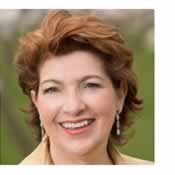Several years into my second marriage, I discovered that some of my marital problems had nothing to do with my husband, Steve, or his kids. I had dragged colossal emotional baggage into the marriage I didn’t even know existed. In his perfect timing, God gently revealed the lies that resided in my head. For the first time I saw the truth hiding behind my anxiety and fear.
This revelation exposed the faulty belief that my value, worth, and significance hinged on rescuing others. My affliction has numerous names, including: enabler, people pleaser, fixer, rescuer, or codependent. But I had falsely assumed I couldn’t possibly be codependent because I have a strong personality. I’d assumed codependents were timid, shy, fragile, and weak.
I was wrong.
Introverts can be people pleasers, but so can those who are gregarious, such as I. This predicament is related more to childhood than personality type. After studying how people pleasing embeds itself in a child and alters a teen and/or adult, I realized I could be the poster child for Codependents Anonymous.
If God taught me, the queen of people pleasing, to overcome the enabling monster, he can to do the same for you.
A person can become codependent for any number of reasons. Most of these patterns can be traced to a problem in the home while growing up. The following list, while not complete, explains some of the most common causes:
- Alcoholism or drugs anywhere within the family.
- Physical abuse: beatings, spitting, biting, slapping in the face, being locked in the closet, etc.
- Emotional abuse including insults, intense criticism, being told “you were never wanted” or “you are stupid.”
- Sexual abuse by a relative, neighbor, or close friend of the family.
- Parents with extensive mental disorders.
- Parents who were physically ill and unavailable.
- Parents who were emotionally unavailable.
- Parents who were absent due to a divorce or workaholism.
- Parents who were unpredictable and yelled, screamed, and accused with no explanation.
- Parents who used the child as a substitute for a mate.
- Parents who coddled or overprotected the child.
- Parents who expected perfection and unrealistic standards.
It makes sense that when our needs were not met as children we gravitate toward someone or something to fill that void. “The more deeply one has been wounded, the higher the probability that one will be codependent. The pain from the past leaks into the present,” states John P. Splinter, author of The Complete Divorce Recovery Handbook.
In my late thirties I finally got help for my enabling issues. That’s when I became a better wife, stepmom, daughter, sister, and friend. I’m not completely cured. Certain issues can still launch my people-pleasing cycle. But now I’m able to identify the problem.
Are YOU a People Pleaser?
In the life coaching sessions I offer, I use four simple words to help me identify whether my client is battling the destructive beast of enabling. The words are, “How can I get?”
Examples: How can I get . . .
My husband to stop drinking/porn/abuse/cheating?
My stepchild’s mom to stop saying horrible things about me?
My in-laws to accept me?
My husband to spend time alone with me?
My kids to appreciate all I do for them?
My husband to see my pain and loneliness?
The answer is the same for the entire list: You can’t. The reality is, you can’t force anyone to do anything he or she doesn’t chose to do. You do not have that much power.
If you still wonder whether you are a people pleaser, here are a few questions that might help. Do you:
- Avoid conflict at all costs?
- Feel guilty saying no?
- Have a sense dread, fear, or anger if not in control of a situation?
- Hear yourself saying, “It’s not really that bad” or “I’m the reason this happens”?
- Fear retaliation or removal of love if you say no?
- Walk on “eggshells,” even in your own home?
- Think submission means ignoring or tolerating destructive behavior?
- Allow people to speak to you a disrespectful manner?
- Make excuses for the rude and offensive behavior of others?
- Isolate or fear what people think of you?
- Refuse to discuss problems or deny help?
- Take on the responsibility for someone who is irresponsible or negligent?
- Try to control others with a feeling of superiority, or treat your spouse like a child?
- Distort God’s teaching about love and mercy into ignoring sin?
If you checked more than three of these, don’t be discouraged. If God taught me, the queen of people pleasing, to overcome the enabling monster, he can to do the same for you.
Let’s get started. Here are some first steps toward overcoming the plague of enabling, people pleasing, and codependency.
‘Fess up! I had to acknowledge that I was an enabler. When I finally admitted I had a problem—dare I say an addiction—to rescuing others, my identity came under attack. The strangulating tentacles of enabling weren’t going down without a fight. This was war.
Find a new identity. Rescuing others was the one thing I thought I did well. After I discovered my destructive survival techniques, it was difficult to let them go. If fixing people was no longer my role, my purpose, my significance, then who was I?
Discover the root. I had to pray hard that God would show me how this perverted thinking began. I knew digging down to the WHY held the key. God used resources such as Healing for Damaged Emotions by David Seamans and The Search for Significance to help me discover how the madness began.
Realize it was all about you. Enabling looks and feels as though it’s helping another, but in reality it’s selfish. I’m a people pleaser because it meets a need in me, or I wouldn’t keep doing it.
Face the fear factor. Codependency and fear are siblings. Typically they go hand in hand and feed off of each other. The needs to please and always be in control of a situation are rooted in anxiety, fear, and dread.
See the truth. What I thought were acts of compassion were the opposite. Isn’t it merciful to shield a loved one from suffering discomfort? Often the answer is no. Sometimes the most loving thing you can do for another is to allow them to suffer a consequence when they make a sinful or poor choice. Pain is often the channel that spurs someone to make the right choice.
Many of us need professional help to overcome codependency. I did. The patterns were so embedded in my mind that I needed an objective professional to help me walk out of the web. Don’t hesitate to do the same. There is no shame in seeking assistance. Your church may have a list of those who specialize in codependency.
Copyright © 2016 Laura Petherbridge. All rights reserved.
Laura Petherbridge is an international author and speaker who serves couples and single adults with topics on stepfamilies, relationships, divorce prevention, and divorce recovery. She is the author of When “I Do” Becomes “I Don’t”—Practical Steps for Healing During Separation and Divorce, The Smart Stepmom, co-authored with Ron Deal, 101 Tips for the Smart Stepmom and Quiet Moments for the Stepmom Soul. Her website is www.TheSmartStepmom.com



 Laura Petherbridge serves couples and single adults with topics on spiritual growth, relationships, stepfamilies, co-parenting, single parenting, divorce prevention, and divorce recovery. She is an international speaker and author of four books including, When “I Do” Becomes “I Don’t”—Practical Steps for Healing During Separation and Divorce, and The Smart Stepmom, co-authored with stepfamily expert Ron Deal and endorsed by Gary Chapman (Five Love Languages), 101Tips for The Smart Stepmom—Expert Advice from One Stepmom to Another and Quiet Moments for the Stepmom Soul-a devotional.
Read more at
Laura Petherbridge serves couples and single adults with topics on spiritual growth, relationships, stepfamilies, co-parenting, single parenting, divorce prevention, and divorce recovery. She is an international speaker and author of four books including, When “I Do” Becomes “I Don’t”—Practical Steps for Healing During Separation and Divorce, and The Smart Stepmom, co-authored with stepfamily expert Ron Deal and endorsed by Gary Chapman (Five Love Languages), 101Tips for The Smart Stepmom—Expert Advice from One Stepmom to Another and Quiet Moments for the Stepmom Soul-a devotional.
Read more at 







